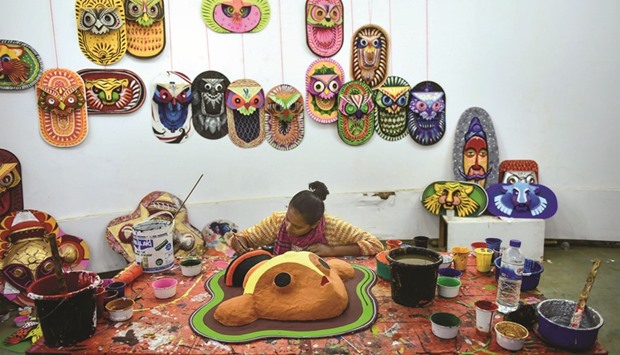There will be “unprecedented” security for this week’s Bengali New Year festivities which hardline clerics have branded “un-Islamic”, Bangladesh police announced yesterday, as the country faces rising religious violence.
Police said thousands of officers would be deployed for the annual street parade to celebrate the New Year on April 14 that traditionally sees hundreds of thousands of revellers swarm through the capital.
“We want people to celebrate the festival safely. Therefore, we have taken unprecedented steps to prevent any mishaps,” Dhaka Metropolitan Police
spokesperson Maruf Hossain Sorder said.
Open-air evening concerts, normally held at Dhaka University and the main Ramna Park, have been banned as part of the stepped up security
arrangements.
“We’re erecting nine security watch towers at the festival venues in an effort to prevent any untoward incident,” Sorder said.
Masks, commonly worn during the New Year parades, are banned this year for security reasons, along with plastic vuvuzela horns to reduce noise pollution, the home minister said last week.
Sorder said police have also launched a stepped up hunt for Islamic militants as Muslim-majority Bangladesh reels from deadly attacks on religious minorities and foreigners in recent months.
The government has blamed the attacks on home-grown Islamic militants, rejecting claims of responsibility from the Islamic State group as well as
Al Qaeda.
Several foreigners were murdered last year, while minority Sufi and Shia Muslims, Christians and Hindus were also targeted in a series of deadly
attacks.
An activist, who posted against Islam on Facebook, was killed last week, the latest in a series of murders of secular bloggers and a publisher.
Police did not say if Bangladesh was facing any specific threat during the New Year, but in 2001 a bomb blast in the Ramna Park killed 10 people. Eight Islamist militants were later sentenced to death for the attack.
Ahead of this year’s festival, a group of clerics has asked the government not to promote the festival, calling it “un-Islamic and haram (forbidden),” according to mass-circulated Bengali daily Prothom Alo.
A long-running political crisis in the majority Sunni Muslim but officially secular country has radicalised opponents of the government and analysts say Islamist extremists pose a growing danger.
Government provides extremists an opportunity: An international report issued yesterday said that by using force and denying justice, the Bangladesh government has provided extremists “an opportunity to exploit the resultant alienation and justify their anti-state agenda”.
The Brussels-based International Crisis Group (ICG) said the government needs to recognise that “it is in its interest to change course, lest it fail to either contain violent extremism or counter political threats”, bdnews24 reported.
The independent and non-profit body also suggested that the US and the European Union should pressurise Dhaka “using its economic levers” to respect civil and political rights.
It has also called upon India “using close ties” to urge the ruling Awami League to allow the opposition legitimate political expression and participation.
“There is no time to lose,” according to its new report on “Political Conflict, Extremism and Criminal Justice in Bangladesh”.
The Crisis Group is also critical to the International Crimes Tribunal (ICT), established in 2010 to prosecute individuals responsible for atrocities committed during the 1971
liberation war.
It termed the ICT “deeply flawed” and said it was “an important example of the dangers of using rule of law institutions for political ends”.

A Bangladeshi Dhaka University Art Institute student paints masks to sell as part of Bengali New Year preparations in Dhaka yesterday. The Bengali calendar is solar, with the year beginning on Pohela Boishakh, which this year falls on April 14, in Bangladesh.
